9+ Sample Roofing Contracts
-
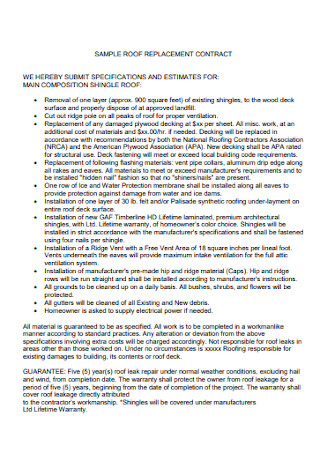
Roofing Replacement Contract
download now -
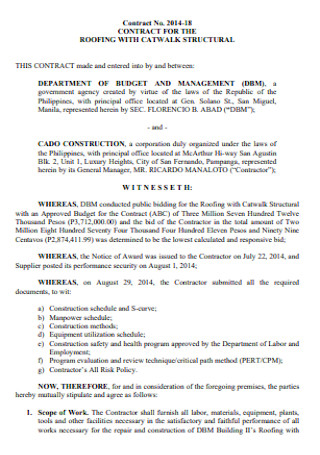
Roofing Contract Format
download now -
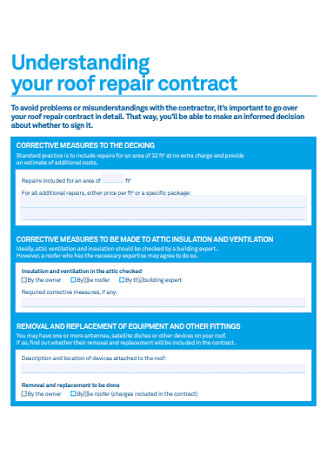
Roofing Repair Contract
download now -
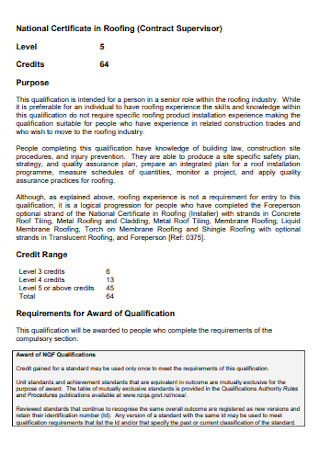
Certificate in Roofing Contract
download now -
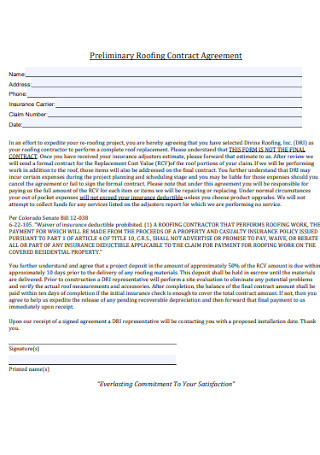
Preliminary Roofing Contract Agreement
download now -
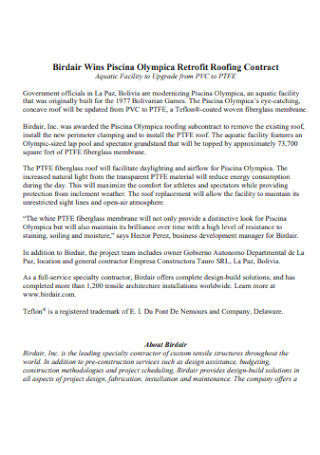
Retrofit Roofing Contract
download now -
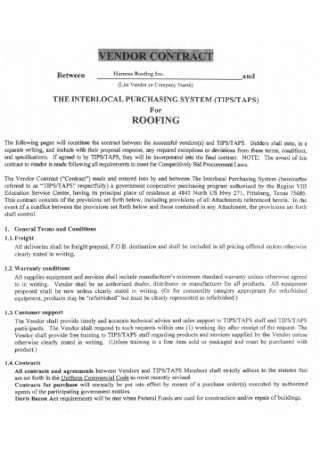
Vendor Roofing Contract
download now -
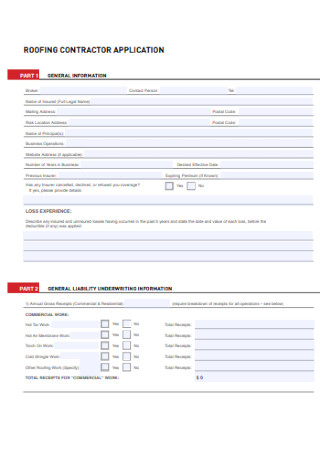
Roofing Contract Application Template
download now -
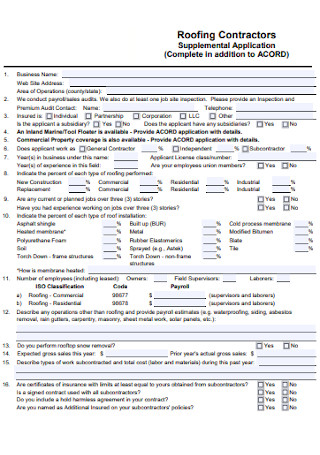
Company Roofing Contract
download now -
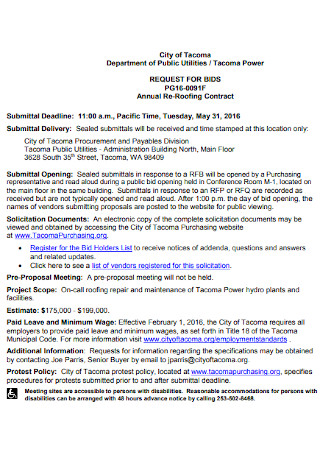
Annual Re-Roofing Contract
download now
FREE Roofing Contract s to Download
9+ Sample Roofing Contracts
What Is a Roofing Contract?
Components of a Roofing Contract
How To Write an Effective Roofing Contract For the Business
FAQs
How do you negotiate a roof contract?
How do you get out of bad roofing contracts in Florida?
What is the cheapest roof to install for residential buildings?
The construction client must consider contractor credentials, past work experiences, pricing plans, and building styles. As there are various parts of a building, there is also various expertise that contractors offer their customers. Whether the client needs replacements for their roofing or they are in the process of building a new one, a contractor must write up a contract to ensure a clear understanding between them and a client. Creating a roofing contract is the way to go. What is a roofing contract, and how does drafting one affect the relationship between the contractor and client? The article contains valuable information about the document, including its definition, components, and construction procedure. A section also answers frequently asked questions regarding this type of contract.
What Is a Roofing Contract?
A roofing contract is a legally binding document between a client and roofer that promises services for a particular job. While more experienced roofing contractors offer lengthier documents to their clients, most roofing contracts are straight to the point. Roofing jobs are delicate by nature, and it takes highly trained and skilled individuals to complete the work efficiently and effectively. Roofing contractors cover different aspects of roofing, including restorations, plumbing, tiling, or painting, and each construction project must have a thorough plan to keep it going. The contractor becomes responsible for executing the roofing project, whether it is for residential or commercial purposes. They are also responsible for gathering their employees to work and charging the client for the necessary labor, materials, and other fees. The roofing contract details the necessary information, including the terms and conditions of the work the contractor needs to accomplish within a given timeframe.
According to the statistical data provided by IBISWorld, the market size of the roofing contractor industry by revenue amounts to 52.2 billion US dollars in 2022. The roofing contractor industry projects an increase of 0.6 percent this 2022. As such, roofing contractors have an average growth rate of one percent starting from 2017 to 2022.
Components of a Roofing Contract
Regardless of the services that a roofing contractor brings to the table, there are essential elements to consider when composing a roofing contract. Certain provisions and terms in the contract must be present for the contractor and the client, whether the building is a commercial or residential area. The section below helps individuals identify the necessary components of a roofing contract together with their descriptions. Familiarity with these terms ensures that the contract is fair to both parties.
How To Write an Effective Roofing Contract For the Business
Roofing contracts often share similarities with job proposals and job estimates. For experienced roofing contractors, there is a possibility of lengthier and more detailed contracts. Regardless of its length, you must evaluate its contents carefully. It is also advisable to discuss various aspects of the roofing job with clients. Below are helpful guidelines that can help you with writing an effective roofing contract to seal the deal with homeowners and business clients.
-
1. Clearly Define the Scope of Work
Since the scope of work identifies what exactly you will do to service client demands and the materials and labor you need to accomplish the job, it is crucial to review its contents together with the client to assure there is a clear understanding of resources you need to finish the work effectively and efficiently. Discuss with clients and allow them to check if the contract contains work details regarding manufacturing warranties and installation requirements. These work details also include ventilation, insulation, and protection, if and when applicable.
-
2. Indicate the Length of the Work
As defined earlier, the duration for any roofing work starts with the first two to six weeks upon signing of the contract. Remind the client that several factors still affect the timeframe for performing work, including backlogs and weather conditions. You must also be straightforward when discussing your availability for them to have realistic expectations in the long run. It is also advisable on the roofing contractor’s part to inform the client of any other unforeseen activities that can affect the work schedule aside from inclement weather conditions.
-
3. List Down All the Necessary Materials and Offered Services
Aside from the basic roofing and labor that the client expects from the roofing project, as a contractor, you must place possible estimates of the materials and services that are part of the construction scope of work, including accessory products and installation warranties and requirements. Allow your clients to inquire about other information, including permit acquisition fees, cleaning services, and disposal assistance. The roofing contractor must also indicate the official names of products and materials for clients to reference manufacturing warranties to the products they utilize.
-
4. Ensure a Clear Arrangement of Deposits and Payment Schedules
For starters, deposits and payments vary from one contractor to another. In certain situations, clients may feel it is unreasonable to pay for security deposits, paying for the entire job much more so. You must also recommend to clients that the deposits they make for you to accomplish the roofing work and other progress payments must not exceed 75 percent of the total roofing value. For roofing contracts, initial, second, and final payments are what clients pay for during the job duration.
FAQs
How do you negotiate a roof contract?
When negotiating with roofing contractors, make sure to discuss the house or building that they need to fix or repair. The contractor must also assess the client’s roofing project plan. The client must have clarity on warranties and whether or not these affect the pricing of materials and labor. Roofing clients must also commit to background checks on potential roofing contractors and obtain second opinions on certain aspects of the contract.
How do you get out of bad roofing contracts in Florida?
Under Florida law, a roofer must acquire one of two distinct types of licenses for them to operate. A client can cancel their roofing contract if their roofing contractor does not have a certified contractor license.
What is the cheapest roof to install for residential buildings?
Asphalt shingles are the cheapest material available in the market. There are three types of asphalt shingles, and out of the three, the cheapest one is the three-tab shingles. These are great options for clients that are tight on their construction budget.
Most roofing contracts are straightforward, allowing clients to easily understand their contents through a thorough discussion between them and the roofing contractor. The document covers various aspects related to roofing services, including painting, tiling, restoration, and repair, among others. The components of a roofing contract include client information, the scope of work, project duration, warranties, installation methods, materials, services, and payment schedule. Construct your roofing contract and start turning client expectations into a reality. Download the 9+ SAMPLE Roofing Contracts in PDF | MS Word today, only from Sample.net.
